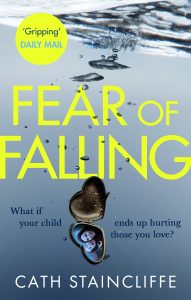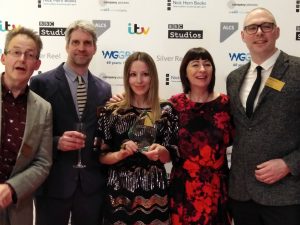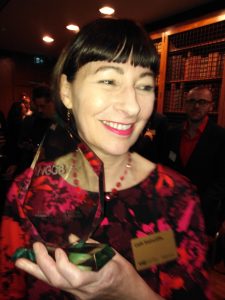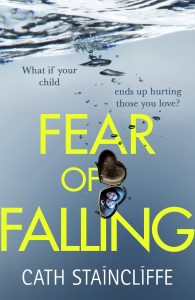I’m currently writing Quiet Acts of Violence, a follow-up to The Girl in the Green Dress and featuring the same detective duo – DI Donna Bell and DC Jade Bradshaw. Originally I wasn’t sure whether the two women would become series characters though I recognised they had the potential to return. Then readers of The Girl in the Green Dress asked me if I’d plans to write more Donna and Jade, they were keen to see them again. Given I’d enjoyed writing them so much and felt there was lots still to discover about them it seemed increasingly like an excellent idea. So here I am. Quiet Acts of Violence sees Donna and Jade investigating the death of a newborn baby and launching a hunt for her missing mother. It’s a novel about family and betrayal, injustice and poverty, the ties that bind and those that break us. Publication date is July 2nd 2020.
Great Stories
When I read I want to be drawn into another world, share someone else’s adventure. There’s nothing quite like losing myself in a good story. And all these books, different though they are from each other, gave me that pleasure.
Brother by David Chariandy
The End We Start From by Megan Hunter
The Guilty Party by Mel McGrath
Ghost Wall by Sarah Moss
Stone Mothers by Erin Kelly
Girl, Woman, Other by Bernardine Evaristo
Clock Dance by Anne Tyler
Nine Knockout Reads
I need say no more.
The Last by Hanna Jameson
The Confessions of Frannie Langton by Sara Collins
Dead Lions by Mick Herron
The Overstory by Richard Powers
Sealskin by Su Bristow
The Chalk Man by C. J. Tudor
Washington Black by Esi Edugyan
Anatomy of a Scandal by Sarah Vaughan
Worst Case Scenario by Helen Fitzgerald
Summer Reads
Some people get more chance to read in the summer holidays so here are a few suggestions for you. Most were recommended by other people – in reviews, on Twitter, from short-lists and by word of mouth. They are books that captivated me and I want to spread the word about them. Happy reading!
Ordinary People by Diana Evans
Normal People by Sally Rooney
Bitter Orange by Claire Fuller
The Wall by John Lanchester
Sal by Mick Kitson
An American Marriage by Tayari Jones
This Mortal Boy by Fiona Kidman
Scrublands by Chris Hammer
Good Books – A Baker’s Dozen
Here are some more of my recent reads (well – not so recent as it’s been three months since I last posted any). Whether you’re going away on holiday or not these books will take you everywhere from the battlefields of Ancient Greece to the stark landscape of the Irish Famine, from the stifling heat of Mississippi to the devastating legacy of the Iraq War, from the American Frontier to a dystopian near-future. Brilliant stories all.
The Wych Elm by Tana French
The Ruin by Dervla McTiernan
Sing, Unburied, Sing by Jesmyn Ward
Digging to America by Anne Tyler
Grace by Paul Lynch
Irma Voth by Miriam Toews
An Unremarkable Body by Elisa Lodato
West by Carys Davies
84K by Claire North
A Visit From the Goon Squad by Jennifer Egan
Pieces of Me by Natalie Hart
Warlight by Michael Ondaatje
The Silence of the Girls by Pat Barker
No Fairytale
 Fear of Falling is out in paperback on May 9th. Thanks to all those who have been in touch to say how it chimed with their own experience of adoption. Here’s The Afterword from the book, which explains why I was drawn to write it.
Fear of Falling is out in paperback on May 9th. Thanks to all those who have been in touch to say how it chimed with their own experience of adoption. Here’s The Afterword from the book, which explains why I was drawn to write it.
Adoption is often thought of as a fairy story, a happy-ever-after for those concerned. But at the heart of every adoption is loss, the loss of family and identity and legacy for the child, the loss of a child for the birth-parents, the loss of the possibility of having a biological child for most adoptive parents who come to adoption because of infertility. I was one of half a million babies adopted in the 1950s, 1960s and 1970s in the UK. The majority of us were adopted because our mothers were unmarried at a time when both Church and state punished such women for transgressing, deeming them morally depraved and unfit to be mothers. There was social stigma and shame attached to being pregnant and unwed, and huge pressure on women to give up their babies. I’ve been fortunate enough to have a successful reunion with my birth-mother and to form strong relationships with her and my seven birth-siblings. My adoptive parents met my birth-mother, brothers and sisters and that was a hugely positive experience. Reunion alongside counselling helped me heal emotionally, and my birth-mother said the same. An important part of that whole process was to acknowledge the grief, insecurity, guilt, even the anger that came with being adopted.
Thankfully, times have changed. Nowadays women have more control over their lives and more choices about contraception, reproduction and sexuality. Families come in all shapes and sizes. Few babies are relinquished for adoption. In this century people who adopt are more likely to be creating a family with a child who has been taken into care, a child who has had a damaging start to life. Friends and acquaintances of mine have adopted and some have encountered serious difficulties with the behaviour of their children, especially as they reach adolescence. Barely any of those families, or the ones I’ve read and heard about, have been able to get access to the sort of support they needed when they needed it. A survey carried out by BBC Radio 4’s File on 4 programme and Adoption UK in 2017 found that more than a quarter of adoptive families were struggling, facing challenges so serious that the adoption was at risk of disruption. It’s not an issue that is widely aired ‒ it’s almost taboo. What is heartening is that nine out of ten respondents were still glad they had adopted. And adoption does work for the majority. But the most vulnerable children in our communities need unstinting assistance, and their families deserve backing to the hilt with resources putting in place for those who require it. Our adoptive parents may give us all the love in the world but sometimes love is not enough.
Nose in a Good Book
Here are some more good reads. Among them a slice of country noir, a chilling dystopia set among the Ojibwe people, a hilarious and heart-breaking state-of-the-nation story, an inventive thriller styled as a podcast and a novel inspired by the Black Lives Matter movement. Enjoy!
The Truth Will Out by AD Garratt
From a Low and Quiet Sea by Donal Ryan
The Invisible Circus by Jennifer Egan
Snap by Belinda Bauer
Future Home of the Living God by Louise Erdrich
The Glorious Heresies by Lisa McInerney
Six Stories by Matt Wesolowski
The Hate U Give by Angie Thomas
Claire De Witt and The City of The Dead by Sara Gran
Crook’s Hollow by Robert Parker
Best Radio Drama – WGGB Awards
I’m absolutely delighted to have won the WGGB Best Radio Drama Award 2019 along with Martin Jameson, Richard Monks, Vivienne Harvey and Alex Ganley for Stone Series 7. Massive thanks to series creator Danny Brocklehurst and to the wonderful BBC Radio Drama North team, producer/directors Nadia Molinari and Gary Brown and sound designer Steve Brooke.

It was a fantastic evening honouring the talents of writers in all fields and remembering those guild members who died in the past year. Presentation and acceptance speeches were in turn passionate, emotional, hilarious and deadly serious. Subjects included the value of stories, the peaks and troughs of a writing life, the importance of laughter, the fight for equality and diversity within the industry and beyond, the power of words to build bridges and to give voice to those we seldom hear, and the urgent need to save the planet.

This year marked 60 years since the foundation of the Writers’ Guild which does stellar work in securing and protecting writers’ rights. You can find out more – and join up if you are writer on the website.
And you can see all the winners here.
Looking For A Good Book?
Happy New Year! It’s been a while since I posted my recommended reads so here’s a delicious dozen of them for you to check out.
Today Will Be Different by Maria Semple
The Woman in the Window by A.J. Finn
The Intrusions by Stav Sherez
The Shepherd’s Hut by Tim Winton
Manhattan Beach by Jennifer Eagan
At Hawthorn Time by Melissa Harrison
Slow Horses by Mick Herron
Thirteen by Steve Cavanagh
Whistle in the Dark by Emma Healey
The Interestings by Meg Wolitzer
The Last Ballad by Wiley Cash
Dark Pines by Will Dean
Fear of Falling
Fear of Falling is published this month and I’m posting the Afterword from it here as it describes where the impetus to write the book came from.
 Adoption is often thought of as a fairy story, a happy-ever-after for those concerned. But at the heart of every adoption is loss, the loss of family and identity and legacy for the child, the loss of a child for the birth-parents, the loss of the possibility of having a biological child for most adoptive parents who come to adoption because of infertility.
Adoption is often thought of as a fairy story, a happy-ever-after for those concerned. But at the heart of every adoption is loss, the loss of family and identity and legacy for the child, the loss of a child for the birth-parents, the loss of the possibility of having a biological child for most adoptive parents who come to adoption because of infertility.
I was one of half a million babies adopted in the 1950s, 1960s and 1970s in the UK. The majority of us were adopted because our mothers were unmarried at a time when both Church and state punished such women for transgressing, deeming them morally depraved and unfit to be mothers. There was social stigma and shame attached to being pregnant and unwed, and huge pressure on women to give up their babies. I’ve been fortunate enough to have a successful reunion with my birth-mother and to form strong relationships with her and my seven birth-siblings. My adoptive parents met my birth-mother, brothers and sisters and that was a hugely positive experience. Reunion alongside counselling helped me heal emotionally, and my birth-mother said the same. An important part of that whole process was to acknowledge the grief, insecurity, guilt, even the anger that came with being adopted.
Thankfully, times have changed. Nowadays women have more control over their lives and more choices about contraception, reproduction and sexuality. Families come in all shapes and sizes. Few babies are relinquished for adoption. In this century people who adopt are more likely to be creating a family with a child who has been taken into care, a child who has had a damaging start to life. Friends and acquaintances of mine have adopted and some have encountered serious difficulties with the behaviour of their children, especially as they reach adolescence. Barely any of those families, or the ones I’ve read and heard about, have been able to get access to the sort of support they needed when they needed it. A survey carried out by BBC Radio 4’s File on 4 programme and Adoption UK in 2017 found that more than a quarter of adoptive families were struggling, facing challenges so serious that the adoption was at risk of disruption. It’s not an issue that is widely aired ‒ it’s almost taboo. What is heartening is that nine out of ten respondents were still glad they had adopted. And adoption does work for the majority. But the most vulnerable children in our communities need unstinting assistance, and their families deserve backing to the hilt with resources putting in place for those who require it. Our adoptive parents may give us all the love in the world but sometimes love is not enough.